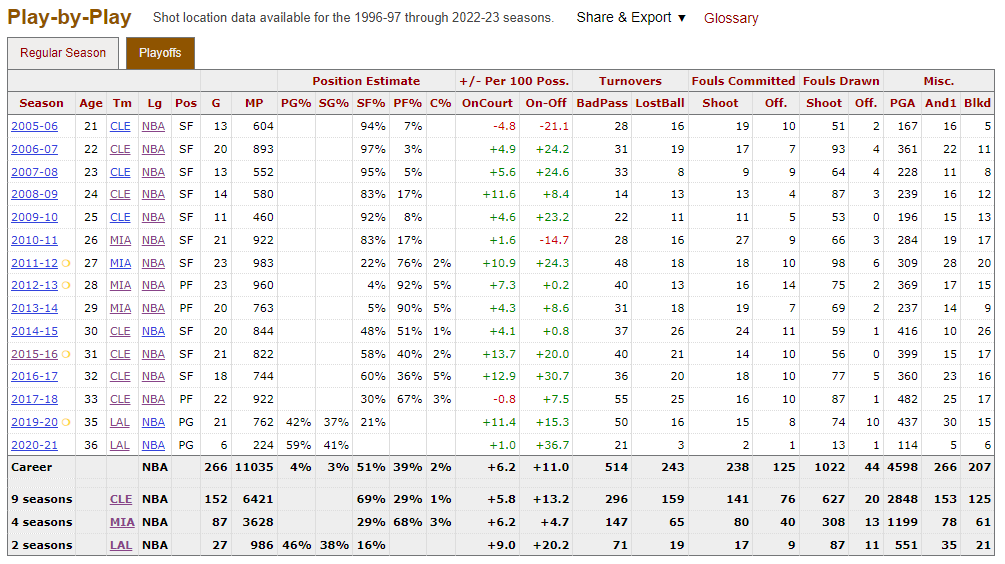Yeah some of these numbers are not correct. I guess you can blame Ben’s per 48 decision for that, or Basketball-Reference’s questionable on/off measurements, but whatever the reason, there is a pretty notable disconnect from replicating the process used for Jordan’s on/off (point differential and minutes).
LeBron has better playoff on/off in 1 year (but only because of an outlier single-series playoffs in 2021; Jordan's ahead otherwise)
Willing to throw out a single series on its own (although we will come back to this…). However, 2017 is not +32 per 48 minutes, it is +33.4 — which I would say is right in the margin of error for Jordan’s 1990, although if someone wants to say Jordan has a slim edge here, that is fine.
Jordan has better playoff on/off in 2 years
Correct, but worth noting Lebron actually has two comparable two-year samples: 2007/08 (+25.8 per 48 minutes) and the identified 2016/17 (+24.9 per 48 minutes by my numbers, but at least the value is close).
Jordan has better playoff on/off in 3 years
Correct, although 2007-09 is right on par with 2008-10 as a young sample, with more games and minutes played.
Jordan has better playoff on/off in 4 years
Incorrect. Lebron’s 2007-10 is +21 per 48 (and probably should be similar even with the pbp/bbr method). No good excuse to have missed that.
LeBron has better playoff on/off in 5 years (but only because of an outlier single-series playoffs in 2021; Jordan's ahead otherwise)
This is disingenuous. The 2016-21 sample covers 88 games, while the 1989-93 sample covers 91 games. Just because it is inconvenient does not mean you get to toss it out (more on that later too). Also, Jordan’s value is mislabeled here. Ben gave us the graphs for this frame, so everyone should have immediately noticed this particular disconnect if they were paying attention.
Jordan has better playoff on/off in 6 years
No, we do not get to just skip 1995 and move on to 1996, that is nonsensical even if the data is a bit fuzzier. Bad form. Beyond that, Lebron’s 2012-17 stretch should be +14.7 per 48 minutes, and then the 2015-21 stretch (unlisted…) should be +16 per 48 minutes — which is of course also higher than Jordan’s 1988-93 stretch. Additionally, Lebron’s 2007-12 stretch should be +15.4 per 48 minutes, so that is two
completely distinct six-year periods topping Jordan’s 1988-93 (so much for consistency).
Jordan has better playoff on/off in 7 years (but LeBron comes out ahead if we include 1995 which has greater uncertainty)
Again, Jordan does not get to skip 1995 because “oh it is tough to tell whether it is abysmal for him or merely awful.” If the goal is to shield Jordan, then I would sooner argue that Jordan’s 1987 likely fares better (would be tough to fare worse). But even then, Lebron’s 2014-21 should be +14.9 per 48, and that is over a 128-game sample (so no, 2021 stays).
Jordan has better playoff on/off in 8 years
Yet again, Jordan does not get to skip over 1995. Still an argument for Jordan over this frame, although I would say it is within the margin of error considering that Lebron caps out at +13.1 per 48 minutes while drawing from an extra thirty games of data.
Jordan has better playoff on/off in 9 years
Once more, no tossing 1995. Increasingly questionable that even with what I will nicely assume is an honest mistake in calculating Lebron’s values, and with Jordan having that peak edge people like so much, it was apparently still necessary to further manipulate the data to benefit Jordan. Anyway, Lebron’s 2012-21 sample should be +14.4 per 48 minutes — right in line with that 1988-93 Jordan sample, with over seventy games extra.
Which leaves is with
actual distribution of:
1-year — Relatively even but with margin toward Jordan
2-year — Jordan, although Lebron has two similarly strong samples a decade apart.
3-year — Jordan
4-year — Lebron
5-year — Lebron (which we already knew…)
6-year — Lebron
7-year — Lebron (including when using Jordan’s six-year sample)
8-year — Relatively even but with margin toward (a smaller sample) Jordan
9-year — Lebron (including when using Jordan’s six-year sample)
Oh, and since there is so much talk about consistency, probably worth mentioning that Lebron’s 2007-21 postseason on/off per 48 minutes is still +13.8.
)... however you can estimate the 1990 off rating by looking at the 3-year on/off averages from 1988-90, 1989-91, 1990-92, and using the known values for 88, 89, 91, and 92. The fact that we have three separate 3-year-averages is great, because it means we can do a by-eye measurement multiple times and when we take the average, hopefully decrease the error. It looks like 3 -year averages are averaged using a minute-weighted average (rather than game number). I got roughly -26.5 +/- 1ish for his 1990 off-rating, but there's some uncertainty here based on how accurately I could measure by eye.












